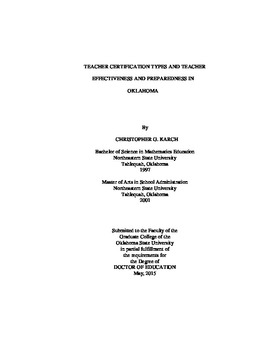| dc.contributor.advisor | Krumm, Bernita | |
| dc.contributor.author | Karch, Christopher G. | |
| dc.date.accessioned | 2016-09-29T18:35:22Z | |
| dc.date.available | 2016-09-29T18:35:22Z | |
| dc.date.issued | 2015-05 | |
| dc.identifier.uri | https://hdl.handle.net/11244/45174 | |
| dc.description.abstract | Like a majority of other states, Oklahoma has provided for alternative methods to teacher certification. This study examines the perceptions of principals and teachers regarding the level of preparedness and ability to develop effectiveness qualities of novice teachers from the Alternative Placement Program and Oklahoma colleges of education. The focus of this case study was to identify these perceptions along with the basis for these perceptions. The qualitative case study design used multiple data collection methods, including interviews of principals and teachers, surveys of principals and teachers, and a review of teacher evaluations to allow for triangulation. Several themes emerged from the data. The first theme was that principals participating did perceive that Traditionally Certified teachers were more prepared for their first year of teaching than Alternative Placement teachers. However, the principals believe that over time, Alternative Placement teachers will develop into just as effective teachers as Traditionally Certified. The largest contrast in the development of teacher qualities between teachers of the two routes occurred in the Classroom Management and Instructional Effectiveness domains of the Tulsa Model of Evaluation. Another theme that became apparent was that teachers who participated believe their actual classroom teaching experiences are more valuable than any of the components of their preparation programs. Also emerging was that participants believe first year teachers struggle regardless of their route to certification; classroom management of first year teachers was a major concern for the teachers and principals alike. Finally, the principals recognized that the individual and characteristics of the individual such as work ethic and commitment to the profession are often as important to consider as the teacher's route to certification. This case study can further the understanding of the strengths and weakness of the two Oklahoma teacher preparation programs researched, as well as the reasons behind the strengths and weaknesses. The findings can also facilitate discussion on how changes can be made to the programs at the state and district level. | |
| dc.format | application/pdf | |
| dc.language | en_US | |
| dc.rights | Copyright is held by the author who has granted the Oklahoma State University Library the non-exclusive right to share this material in its institutional repository. Contact Digital Library Services at lib-dls@okstate.edu or 405-744-9161 for the permission policy on the use, reproduction or distribution of this material. | |
| dc.title | Teacher certification types and teacher effectiveness and preparedness in Oklahoma | |
| dc.contributor.committeeMember | Harris, Ed | |
| dc.contributor.committeeMember | Barnes, Laura | |
| dc.contributor.committeeMember | Koch, Julie | |
| osu.filename | Karch_okstate_0664D_13949.pdf | |
| osu.accesstype | Open Access | |
| dc.type.genre | Dissertation | |
| dc.type.material | Text | |
| thesis.degree.discipline | School Administration | |
| thesis.degree.grantor | Oklahoma State University | |
